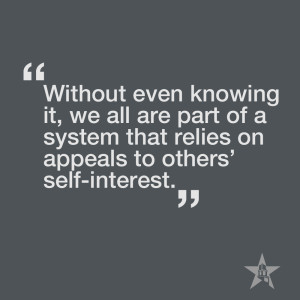Over my time at Houghton I have heard many students complain about the greediness of corporate America, and the unfairness associated with the division between rich and poor. These students never discuss their own greed or how appeals to it motivate them to helpful and efficient action.
Famed English political economist, Adam Smith wrote, “It is not from the benevolence of the butcher, the brewer, or the baker that we expect our dinner, but from their regard for their own interest.” Smith argues that in order to have sustenance, we must appeal to the self-interest of those around us. In economics, we learn that this is both an effective and efficient way to run an economy.
 Without even knowing it, we all are part of a system that relies on appeals to others’ self-interest. Schools prompt you to learn by giving you grades, employers pay for your performance, and governments subsidize good choices. The same self-interested behavior that we display is the motive for businesses as well.
Without even knowing it, we all are part of a system that relies on appeals to others’ self-interest. Schools prompt you to learn by giving you grades, employers pay for your performance, and governments subsidize good choices. The same self-interested behavior that we display is the motive for businesses as well.
Businesses emerge to fulfill a want or a need, and they succeed by providing it at a lower price, or with a higher quality, compared to others. By doing this, they create a competitive advantage that allows them to use resources more effectively than the average person can. For example, a bread maker must buy ingredients to make the bread, mix the ingredients, knead the dough, let it rise, and finally bake it before it can be sold. The bread maker can leverage the size of his operation and expertise so as to make a hearty loaf for much cheaper than the average person can, especially when considering the time it takes to gather and process those resources. For the bread-maker to do this, he will require some sort of compensation which comes in the form of profit.
The word profit causes many Christians and other advocates for non-profit organizations to cringe, but profit is actually Biblical and necessary for our economy to advance. Businesses operate by giving money to their most efficient uses, and profits are no different. Businesses need profits to grow, to research, and to pay back what they have borrowed. Profit can also be used by businesses to support local sports teams, food pantries, and church groups.
 The beauty of this system of appealing to another’s self-interest is that it does not just help the rich; instead, it helps everybody. Much that we use on a daily basis has been created as a result of somebody figuring out a way to produce and sell it at a profit. While it seems that the rich keep getting richer and the poor are getting poorer, generally people are better off today than they have been in the past because of for-profit businesses.
The beauty of this system of appealing to another’s self-interest is that it does not just help the rich; instead, it helps everybody. Much that we use on a daily basis has been created as a result of somebody figuring out a way to produce and sell it at a profit. While it seems that the rich keep getting richer and the poor are getting poorer, generally people are better off today than they have been in the past because of for-profit businesses.
The one caveat here is that efficient commerce requires a strict set of moral values on which businesses, and the nation are built. For Smith and others, commerce must be guided by enlightened self-interest. America has done a great job creating a strong sense of ordered liberty, tempering justice with freedom that have allowed businesses to flourish. While our system is not perfect, and examples of abuse arise constantly, I am thankful for the self-interested behavior that has provided me with the amenities I enjoy everyday.
